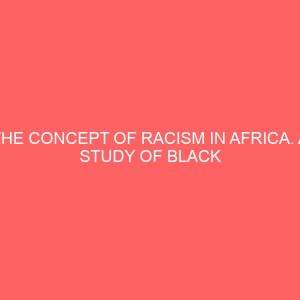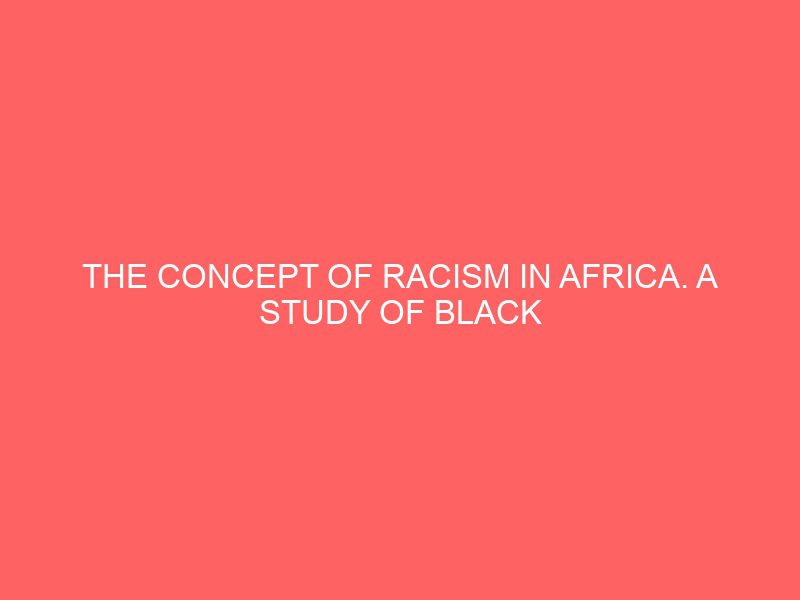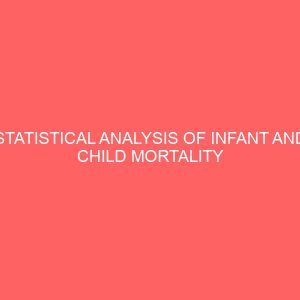Description
CHAPTER ONE
INTRODUCTION
This literature is on The concept of racism in Africa. A study of black boy by Richard wright and mine boy by peters Abraham. Racism is discrimination and prejudice towards people based on their race or ethnicity. Today, the use of the term “racism” does not easily fall under a single definition. (Garner, Steve 2009)
The ideology underlying racist practices often includes the idea that humans can be subdivided into distinct groups that are different in their social behaviour and innate capacities and that can be ranked as inferior or superior. The Holocaust is the classic example of institutionalized racism which led to the death of millions of people based on their race. While the concepts of race and ethnicity are considered to be separate in contemporary social science, the two terms have a long history of equivalence in both popular usage and older social science literature. “Ethnicity” is often used in a sense close to one traditionally attributed to “race”: the division of human groups based on qualities assumed to be essential or innate to the group (e.g. shared ancestry or shared behaviour). Therefore, racism and racial discrimination are often used to describe discrimination on an ethnic or cultural basis, independent of whether these differences are described as racial. According to a United Nations convention on racial discrimination, there is no distinction between the terms “racial” and “ethnic” discrimination. The UN convention further concludes that superiority based on racial differentiation is scientifically false, morally condemnable, socially unjust and dangerous, and there is no justification for racial discrimination, anywhere, in theory or in practice. (“International Convention on the Elimination of All Forms of Racial Discrimination” Office of the United Nations High Commissioner for Human Rights Retrieved December 23, 2011)
Racist ideology can become manifest in many aspects of social life. Racism can be present in social actions, practices, or political systems (e.g., apartheid) that support the expression of prejudice or aversion in discriminatory practices. Associated social actions may include nativism, xenophobia, otherness, segregation, hierarchical ranking, supremacism, and related social phenomena.
In the 19th century, many scientists subscribed to the belief that the human population can be divided into races. The term racism is a noun describing the state of being racist, i.e., subscribing to the belief that the human population can be classified according to race. The origin of the root word “race” is not clear. Linguists generally agree that it came to the English language from Middle French, but there is no such agreement on how it came into Latin-based languages, generally. A recent proposal is that it derives from the Arabic ra’s, which means “head, beginning, origin” or the Hebrew rosh, which has a similar meaning. (Online Etymology Dictionary retrieved 21 February 2016) Early race theorists generally held that some races were inferior to others and that differential treatment of races was consequently justified. (Garner, Steve 2009). These early theories guided pseudo-scientific research assumptions; the collective endeavours to adequately define and form hypotheses about racial differences are generally termed scientific racism.
Today, most biologists, anthropologists, and sociologists reject a taxonomy of races in favour of more specific and/or empirically verifiable criteria, such as geography, ethnicity or a history of endogamy. (Bamshad, Michael; Steve E. Olson December 2003). To date, there is little evidence in human genome research indicating that race can be defined in such a way as to be useful in a genetic classification of humans. (Patrinos, Ari (2004)
An entry in the Oxford English Dictionary (2008) defines racialism simply as “An earlier term than racism, but now largely superseded by it,” and cites it in a 1902 quote. (“racialism, n.” OED Online September 2013) The revised Oxford English Dictionary cites the shortened term “racism” in a quote from the following year, 1903. It was first defined by the Oxford English Dictionary as “the theory that distinctive human characteristics and abilities are determined by race”, which gives 1936 as the first recorded use. Additionally, the Oxford English Dictionary records racism as a synonym of racialism: “belief in the superiority of a particular race”. By the end of World War II, racism had acquired the same supremacist connotations formerly associated with racialism: racism now implied racial discrimination, racial supremacism and a harmful intent. (The term “race hatred” had also been used by sociologist Frederick Hertz in the late 1920s.)
As its history indicates, popular use of the word racism is relatively recent. The word came into widespread usage in the Western world in the 1930s, when it was used to describe the social and political ideology of Nazism, which saw “race” as a naturally given political unit. (Fredrickson, George M. (2002). It is commonly agreed that racism existed before the coinage of the word, but there is not a wide agreement on a single definition of what racism is and what it is not. Today, some scholars of racism prefer to use the concept in the plural racisms to emphasize its many different forms that do not easily fall under a single definition and that different forms have characterized different historical periods and geographical areas. (Garner 2009) summarizes different existing definitions of racism and identifies three common elements contained in those definitions of racism. First, a historical, hierarchical power relationship between groups; second, a set of ideas (an ideology) about racial differences; and, third, discriminatory actions (practices)
- BACKGROUND OF THE STUDY:
Racism in literary studies is defined by Wikipedia as the belief of genetic factors which constitute race, are the primary determinants of human traits and capacities and that racial differences produces an inherent superiority of a particular race. Racism effects are called racial discrimination. Although the term racism usually denotes race based on prejudice, violence, dislike, discrimination or oppression. Racism is also defined simply as a reflection of the economic system and its cultural, ethnic and political ways. The concept of racism is derived from the word race and it is believed that one racial or ethnic group is inferior to another and the unequal treatment is therefore justified.
According to Charles V. Hamilton and Kwame Ture they defined racism as “A prediction of decision and policies on consideration of race for the purpose of subordinating a racial group and maintaining control over that group”.
On the other hand, oppression is defined by the encyclopedia as torture or degrading treatment and the use of threat or violence. It is also the exercise of power/authority in a burden, cruel or unjust manner. Oppression is also defined by Wikipedia as an act or instance of oppressing the state of being oppressed and the feeling of being heavily burdened; mentally or physically by troubles adverse conditions and anxiety.
It is this experience of Black Slaves that Richard Wright and Peter Abraham tries to capture in in their respective books Black Boy (1945) and My Boy. In the text, Wright recalls the plight of the Africans that were sold into slavery between the early 1700’s and 1860’s through the convenience of their own fellow Africans. They were transplanted to American, Canada, the Caribbean Island and other parts of the world. The Africans taken into America were now referred to as “Black Americans” while those on the Caribbean Island are called “Afro Caribbean” but they all have a common roots and common problem- Racial Discrimination. The Africans faced a great ordeal trying to survive hardship on their journey across the Atlantic Ocean on arrival to America; they were conscripted into force labour, maltreated, abused and demoralized on the cotton fields and plantation where they were put to work as slaves. As a result of this hardship deprivation and degradation, the blacks began expressing themselves through Negro spirituals which marked the beginning of the artistic expressions of the emotion. They told stories of unpleasant experience of slavery and oppression through pamphlet and short stories, which formed the basic of Black writings and which were later referred to as “Slave Narrative” or “secret text” because they were written without the knowledge of the slave owners. This inhuman trade led to the transportation of Africans to American to work as slave on the plantation where they experienced unimaginable oppression from the white owner. Many youth are ignorant of this fact and see American as a peaceful place and a bed of roses.
The project therefore sets out to trace the origin of racism in Africa and try to expose the horrible experience that the black slaves went through. The experiences of the blacks recounted by Richard Wright in Black Boy and Peter Abraham in My Boy will therefore by analyzed to expose the themes of racism and oppression as aspect of the African society.
- STATEMENT OF PROBLEM:
Racism and oppression of the Blacks has been a thing that is as old as the World itself sad enough, most people does not know its origin in the African continent and how deep it has eaten into the fabrics of the content. The blacks on the other hand do not know their worth and most of them discriminate among their selves. This project therefore will focus on analysing the concept of racism as showcased in the novel Black boy and My boy written by Richard Wright and Peter Abraham.
- OBJECTIVE OF THE STUDY:
The objective of this study is to create an awareness of racism and oppression using the personal experience of Richard Wright in his autobiography Black Boy and Peter Abraham in My Boy.
This project concentrates on the theme of racism and oppression in Black literature. The intention of the researcher is to show that racism and oppression indeed is a prominent theme in Black Boy and My Boy especially because the book was written during the Jim Crow era at a point where racism was very prominent in the American society.
It also looks at the personal understanding of the Blackman’s point of view and his situation. Examples of racism and oppression are cited in Black Boy. This project exposes how racism and oppression affects the mentality and the way of living of the Black race, reducing them to a level of inferiority, in every aspect of their lives.
- SCOPE AND LIMITATION OF THE STUDY:
The scope and limitation is on the theme of racism and oppression in Black Boy and My boy by Richard Wright and Peter Abraham so as to prevent the project from being untidy and ambiguous in nature. From intense research we believe that Black Boy, an eye witness account is accurate enough to fully express the terms of racial segregation and oppression because it has made a strong impact on American literature with its strong commentary on the cultural, political, racial and social issues going on during the period of 20th century racism.
The very title of the book “Black Boy” already gives us an idea of our thematic discussion because he uses the term ‘Black’ in the title to emphasize the fundamental racial facts of his life (the author Richard Wright); the black against the white. Black race subordinate to the white race which is the main and only scope and limitation.
- SIGNIFICANCE OF THE STUDY:
Many works have been carried out on Black American literature majorly focusing on self-identity and racism. For example Babalola (1992) “The concept of racism and crisis of self-identity in James Baldwin’s Go Tell it on the Mountain (1954) and George Lamming’s Water with Berries (1972) focused on aspect of racism. Both novels highlighted the concept of self-identity. The present study will be different from the works mentioned above. It will shed more light on oppression experienced by the African’s using Richard Wright’s autobiographical novel {Black Boy} and Peter Abraham novel (My boy) black American literature.
- METHODOLOGY:
The methodology used in this project is a Carl Jung (1952) psychological approach in literature. It is believed that this approach will best expose the inner mind and psychological torture of the Black American characters in Black Boy. Oppression and Racism are better analysed, examined and portrayed through the workings of the intellectual thinking of those affected black American literature. This approach is the only approach that has helped to review visual and close insight of confrontations and conflicts between the Blacks and the Whites. Black American literature Concentration is placed on the major character which serves as the representative character for the Blacks. Black American literature through his life experience, we can deduce the predicament of the Black Americans in South Africa. Black American literature








Reviews
There are no reviews yet.